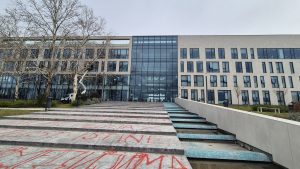A study of recent electoral cycles in Romania, Bulgaria and Kosovo shows what can happen when algorithms are allowed to hack democracy. This new ‘TikTokcracy’ must not go unchallenged.
In December 2024, Romania suspended democratic reality. A presidential vote was annulled because tens of thousands of algorithmic ghosts had whispered a virtually unknown pro-Russian candidate into the lead. Democracy was hacked by attention.
We’ve entered the age of ‘TikTokcracy’, where governments can be ‘elected’ not by genuine support, but by automated, manufactured popularity. It’s the new constitutional future facing Europe and the reality in which the EU’s southeastern front already lives.
We are witnessing the dissolution of a foundational premise of democratic theory: that citizens, given access to information and the space for reflection and debate, can self-govern.
What happens when the information environment itself becomes a weapon? When does algorithmic architecture and engagement metrics of attention become the primary mediators between citizen and state?
The Balkan Free Media Initiative’s new study, launched in partnership with Sensika, reveals that Romania’s experience was not an anomaly. There, networks of fake TikTok accounts, paid influencers, and misinformed supporters acted in coordination – sometimes knowingly, sometimes unknowingly – to generate manufactured popularity for Calin Georgescu.
This orchestrated use of fake accounts, paid actors, and unwitting participants to artificially amplify content and create the illusion of organic support represents coordinated inauthentic behaviour.
These networks pushed biased and often false narratives to Romania’s most disenchanted voters – young people and the diaspora. The result was a surge in support for Georgescu, as well as distrust in Romania’s already fragile democracy.
We found similar patterns of coordinated inauthentic behaviour, unmarked political content, and artificial amplification timed to electoral cycles in Bulgaria and Kosovo – the kind of manipulation that traditional monitoring, platform transparency tools, and current enforcement mechanisms have missed.
Faster than human cognition
In the region, where TikTok penetration rates rank among Europe’s highest, the platform has become a kind of shadow government, with no accountability to anyone but its shareholders.
Embedded in the media and economic system, influence networks lie dormant, adaptive, and always ready to activate. In fragile contexts, like Kosovo, early-stage algorithmic interference can inflame pre-existing tensions and create instability that cascades beyond elections.
Triangulated, Romania, Bulgaria, and Kosovo show a new ecology of power in which influence is distributed across invisible networks, optimised to operate faster than human cognition, and capable of sculpting both perception and behaviour before institutions or the public can respond. Democracy is no longer a negotiation among citizens.
If virality can manufacture momentum, what does it mean to gauge public opinion? This is a question that Paris and Berlin are no doubt brainstorming ahead of approaching elections.
The southeast front is useful here beyond being a preview of the continent’s future. The illusion that electoral manipulation is a Balkan export, quarantined by borders or technical fixes, no longer holds; each electoral cycle demonstrates that in the new order, any state with a penetrable digital infrastructure is fair game.
From our research, what emerged was a hybrid system where these manipulation tactics can distort democratic processes by creating artificial consensus that shapes the perceptions and behaviours of voters exposed to manufactured trends.
Decision-making grows more reactive, less reflective, and opinion can shift according to the rhythms of coordinated campaigns designed to exploit platform algorithms. The algorithm has become an agent of democratic distortion.
Democratic self-government cannot survive on autopilot
Europe’s policymakers, facing this new terrain, are caught between inertia and alarm. Calls for a European Democracy Shield echo through parliaments and the Brussels corridors of power, but beneath the rhetoric is confusion about where to draw the line between legitimate persuasion and engineered perception.
Trust, the fragile currency of democracy, erodes quickly when voters cannot distinguish between genuine debate and manufactured consensus. The result is cynicism, withdrawal, or worse: the perennial temptation to embrace strongmen who promise order and clarity amid informational chaos.
The manipulation of engagement metrics has changed the meaning of the vote. The Southeast European experience shows that democratic self-government cannot survive the algorithmic age on autopilot.
If Europe hopes to restore genuine political agency, it must address specific challenges by, for example, strengthening platform transparency requirements, improving detection of coordinated inauthentic behaviour, ensuring clear labelling of political content, and building public literacy around manipulation tactics.
The alternative is clear enough in the TikTokcracy’s shadow: a democracy so shaped by manufactured consensus that its future will be chosen less by voters, and more by whatever coordinated campaigns happen to trend next.
Peter Horrocks is the co-founder of Balkan Free Media Initiative, BFMI.
Source: BalkanInsight



